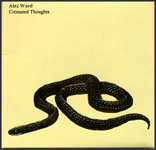|
|
 |
Dusted Reviews
Artist: Alex Ward Album: Cremated Thoughts Label: Treader Review date: Jan. 16, 2009 |

|
|
|
 |
For years, Alex Ward wore the ‘new music’ albatross of youth around his neck. He played clarinet in Derek Bailey’s 1988 Company at age 14 and subsequently recorded for Incus and appeared in the much older Bailey’s On the Edge documentary. In addition to the passing of time (he is now well into his 30s), Ward seems to have shaken off the past with some help from his guitar. After playing in rock bands such as Camp Blackfoot (with Benjamin Hervé) and the poppier Pocket (with John Bisset), he now appears regularly on guitar in his own fine improvising trio with John Edwards and Steve Noble.
Ward’s previous solo album of songs, Hapless Days (Copepod, 2005), featured no clarinet. His most recent outing on clarinet was with the quartet Barkingside (Emanem, 2008), with whom he displayed his habitual breathtaking technique and inventiveness. Now, Cremated Thoughts is Ward’s first solo album on clarinet. Recorded in January 2008 at Abbey Road, the recording gives a vividly immediate impression of Ward’s playing, catching every squawk, overtone and nuance – vital to appreciating music such as this. Much of the time, Ward generates an appealingly warm wooden tone, offset by occasional ventures into the harsher regions of his instrument’s palette. On the opener, “CT1,” he has a dialogue with himself, calling and responding in two registers before leading into a series of ascending and descending runs at different tempos, some complex but coherent, some melodic. Based on the aural evidence, it would be easy to believe that two clarinettists were taking turns to play.
The shorter “CT2” starts in a restrained fashion, then explores the clarinet’s more extreme sounds, augmented by vocal utterances including roaring, purring and tortured groaning that is at times reminiscent of an extreme Phil Minton vocal (now, that would be a good duo to hear…). By contrast, “CT3” revels in and celebrates the warm low tone. Ward opens with a passage that demonstrates it to best effect before introducing a contrasting phrase in the higher register. Finally, “CT4” opens with an almost classical deliberation as Ward starts with a seemingly simple theme that he gradually elaborates, explores and unpicks, not afraid to repeat phrases that work and sound appealing. (Come to think of it, “cremated thoughts” is an interesting use of language to describe the improvisers’ art.)
Cremated Thoughts has already been compared to great solo saxophone albums like Anthony Braxton’s For Alto and Evan Parker’s Monoceros. Those are tough comparisons, but realistic ones based on the music here.
By John Eyles
|







